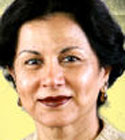
By Ghazala Hayat
May 30, 2015
I have been to France a few times and cherish the beautiful memories of an illuminated Eiffel Tower, Louvre, delicious meals and English with a musical accent. But over the last decade, I have observed with concern the rising tide of bias against Muslims in France.
Muslims make up about 8 percent of the population in France. Recently, an article in The New York Times highlighted the results of decade long restrictions on Muslim women wearing a veil. The restrictions have isolated many Muslims, including men in France, and may have added to bias and Islamophobia.
In 2004, a law was passed in France that banned wearing veils in schools. In 2010, France banned veils in the public sphere. The ban also affected the expression of other religions, i.e. Crosses, Yarmulkes.
Secularism in France, protected by a law known as "laicite," can be traced to the 19th century. The law was established to eliminate the impact the Roman Catholic Church had on education. Laicite is “absence of religious involvement in government affairs as well as absence of government involvement in religious affairs." Over the years, the law has grown to mean the “equal treatment of different faiths."
Many Americans will interpret the French law to mean freedom of religion, but what has transpired over the last decade is increasing hostility towards faiths, especially Islam. There has been a steep rise in anti-Muslim acts over the last few years, mostly against women. A Muslim woman wearing a scarf can feel under scrutiny and isolated.
Proponents of the ban defend it stating “a person can exercise his/her faith in the private life but should appear equal in public sphere.” I fail to understand how taking away expressions of faith make people equal. This is a slippery slope; the concept of secularism should not entail a government telling its people what not to wear to appear “equal” in public.
Proponents of the ban on veils state that this is for security; others claim it is to eliminate social consequences. All of these are weak arguments. Muslim women will take their veil off if asked for identification. According to many surveys, there are about 2,000 women in France who wear a veil covering the face. I fail to understand how such a tiny fraction of the French population can have social consequences on public life.
There have been incidents where mothers were banned from picking up their children from schools because they were wearing scarfs. Some Muslim women covering their heads are also restricted from taking part in school activities. Students have been sent home from public schools if they were covering their heads in observance of their faith. I may not comprehend the pain, humiliation and distress these students/families are experiencing. The isolation experienced by these families and the frustration/anger of other Muslims is not strengthening the fabric of the French public sphere.
In France, even though there is separation of church and state, Christmas and many other Christian holidays are observed at the government level. One veiled mother who was banned from the property of a school had worked for the school's Christmas party.
Some French Muslims also believe that when they were needed for work decades ago, their expression of faith did not matter. Now that the need is less, anti-Muslim sentiments are on the rise and laws that marginalize Muslims have been enacted. Each year hundreds of thousands Muslims from all over the world visit France. Some of them wear veils; not sure how the ban affects them.
Laicite has fanned more anti-Muslim sentiments and increased Islamophobia in France. Many believe that instead of secularism, that this is anti-clericalism (opposing the religion and clergy) and a violation of an individual’s right to express their religion.
The European Court of human rights in 2014 upheld the ban on full-face veils in public in the interest of everyone "living together." According to the ruling, "The question of accepting or not that the full veil can be worn in public is a society's choice." Many Muslims and non-Muslims were shocked by this ruling, as this does infringe upon a person’s right to practice his/her religion. Societies evolve. With globalization and increased immigration, there will be changes in the structure of society. I believe societies have to adapt to changing realities on the ground. It should not mean minorities are unable to practice their beliefs freely.
The proponents of this ban also claim these laws are to “integrate people." If we do not respect someone’s choice of expression of faith, we do not integrate them, we isolate them. This also plays in the hands of radicals who claim that the “West is anti-Islam."
The unfortunate Charlie Hebdo terrorist attack also brought to attention the marginalization of Muslim youth in France. We all stand together in fighting terrorism, but we should resist any constraints on freedom of religion.
Our constitution probably provides the best possible protection of freedom of religion for diverse societies. Faith is one of the main identities of individuals. The more we respect/defend everyone’s right to practice his/her faith without undue burden on society, the more societies will flourish. I believe strongly that our forefathers wrote the constitution with the principle of “Freedom of religion but not freedom from religion."
Source: http://www.stltoday.com/lifestyles/faith-and-values/civil-religion/ghazala-hayat/the-world-needs-freedom-of-religion-not-freedom-from-religion/article_9a3eb94e-060f-11e5-9dd8-777c2207e87d.html




 Moderate Islamist here
Moderate Islamist here


0 comments:
Post a Comment